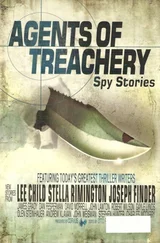David Ignatius - Agents of Innocence
Здесь есть возможность читать онлайн «David Ignatius - Agents of Innocence» весь текст электронной книги совершенно бесплатно (целиком полную версию без сокращений). В некоторых случаях можно слушать аудио, скачать через торрент в формате fb2 и присутствует краткое содержание. Жанр: Шпионский детектив, на английском языке. Описание произведения, (предисловие) а так же отзывы посетителей доступны на портале библиотеки ЛибКат.
- Название:Agents of Innocence
- Автор:
- Жанр:
- Год:неизвестен
- ISBN:нет данных
- Рейтинг книги:3 / 5. Голосов: 1
-
Избранное:Добавить в избранное
- Отзывы:
-
Ваша оценка:
- 60
- 1
- 2
- 3
- 4
- 5
Agents of Innocence: краткое содержание, описание и аннотация
Предлагаем к чтению аннотацию, описание, краткое содержание или предисловие (зависит от того, что написал сам автор книги «Agents of Innocence»). Если вы не нашли необходимую информацию о книге — напишите в комментариях, мы постараемся отыскать её.
Agents of Innocence — читать онлайн бесплатно полную книгу (весь текст) целиком
Ниже представлен текст книги, разбитый по страницам. Система сохранения места последней прочитанной страницы, позволяет с удобством читать онлайн бесплатно книгу «Agents of Innocence», без необходимости каждый раз заново искать на чём Вы остановились. Поставьте закладку, и сможете в любой момент перейти на страницу, на которой закончили чтение.
Интервал:
Закладка:
The members of the Old Guard had nearly all been born outside of Israel. Many of them had been intelligence officers for the Haganah or Lehi or Irgun at the time of the war of independence in 1948. They had arrived in Palestine from every corner of the globe. Refugees all, they had fled Europe in the 1930s for China, Russia, India, America-and travelled from there to Eretz Israel. They seemed to speak every language in the world. Was there an operation in Ethiopia? There was sure to be a Mossad man who spoke fluent Amharic. Was there an operation in the Far East? There were speakers of the Mandarin and Cantonese dialects of Chinese, speakers of Japanese, Korean, Thai, all of whom had suffered through the war years and made their way to the Jewish homeland. The Old Guard had been trained in the cruelest school the world has ever known, and they didn’t let the younger men forget it.
The younger Mossad officers were a different breed. They had come into the security service not from the desperate exile world of the 1930s and 1940s, but from the Israeli Army, from the proud and self-reliant military arm of the new Jewish state. They had joined Mossad after proving themselves in the special operations units of the army and navy. They were, in their own way, just as tough as the refugee generation.
When Levi looked at his younger colleagues, he saw hard, muscular bodies and dark faces. Many of them were Oriental Jews, whose families had lived in Baghdad or Casablanca or Cairo. They might have difficulty speaking English and German. But they spoke perfect Arabic. And that, Levi suspected, was exactly what the state of Israel needed in the 1970s.
The glory days of the Mossad were over. Eichmann and the other Nazi war criminals had been caught. The Jewish networks in the Soviet Union, which had allowed Mossad to obtain Khrushchev’s secret speech to the 1956 Party Congress, had mostly been broken. There wasn’t much need, any more, to send terrified couriers through Russia and Eastern Europe gathering the tidbits of intelligence that Mossad had used to trade with the Western intelligence services. The Israelis didn’t need to beg and barter just to stay alive any more. That much had been assured.
Now the tasks were different. The problem was manipulating the environment around Israel. Rewarding friends and punishing enemies in the Middle East. The young men around Levi had earned their reputations not in Moscow or Rome but parachuting into Kurdistan to help the Shah of Iran make trouble for Iraq; or parachuting into southern Sudan to help foment a civil war. Or travelling secretly to Morocco to help teach the Moroccan Army how to defeat the Polisario guerrillas. Those were the new challenges, and they involved what the new breed of Mossad liked best: Playing games with the Arabs, driving the Arabs crazy.
The security establishment prospered because everyone accepted the rules. Every able-bodied Israeli male served in the military-every journalist, politician, avant-garde intellectual-and they all accepted the basic imperatives of military discipline. The interests of national security came first: the journalist agreed to be censored; the politician agreed not to question the government about certain sensitive matters; everyone agreed to protect the security agencies-Mossad; Shin Beth, the Israeli FBI; Aman, or military intelligence; Unit 8200 of Aman, which collected signals intelligence; Unit 269 of the army general staff, which conducted secret operations; and the Scientific Research Bureau, or “Lekem.” And of all these elite units, the most elite was Mossad-the Institute. If the security of Israel was the nation’s secular religion, the officers of the Mossad were its high priests.
Levi submerged himself in the world of Black September. He became the daily watch officer for that account, the person who sifted through each day’s harvest of agents’ reports and communications intercepts for information that might help the Israelis to prevent the next attack. Levi found that easy. He was a well-organized man. He liked to make lists, read through old files, pull bits of information from his memory and match them with current intelligence.
Levi worried that he was always a few steps behind the people he was tracking. His gut told him that Black September was a ruse, that its operations were really the work of Fatah. But that wasn’t enough. He needed proof: the names of the people who planned the operations, who provided the weapons, who serviced the drops, who paid the gunmen. He needed to peel away the cover and see the machine at work, to see how each piece fit together in the covert organization.
As an exercise, Levi gathered every fact he could find about two Black September operations: the bombing of an electronics plant in Hamburg and the sabotage of an oil terminal at Rotterdam. He began to see a pattern, a distinctive signature that identified these operations and others as the work of a particular individual. The operations had several obvious common characteristics:
– They were meticulously planned. The bombs exploded where they were supposed to, when they were supposed to. They did the damage that was intended, no less and no more. Warnings were delivered when appropriate. Credit was taken in a distant capital, usually just a few minutes after the attack.
– They were clean. There were no obvious clues. Frightened Arabs weren’t caught running from the scene. Fingerprints weren’t found. Guns with traceable serial numbers weren’t captured.
– They were professional. Levi suspected that the planner must be a trained intelligence officer, who knew how to cover his trail. Checks of the Arab underworld in Europe, and of agents who operated on the fringe of the guerrilla movement, failed to turn up any clues. Inquiries with arms dealers who might have supplied weapons and explosives also produced nothing. Whoever was planning the operations was skillful enough to keep several layers of cut-outs between himself and his handiwork.
– They were the work of someone who spoke German. Though Black September operated across Europe, it seemed to strike in West Germany with unusual regularity. Whoever was planning the operations felt comfortable there, spoke the language, understood the culture.
The German-speaking requirement triggered something in Levi’s memory. There was a Palestinian operative in Beirut who had been renowned for his continental charm, and his ability to bed down women from every province of Europe. What Levi remembered now was the voice of that Palestinian, recorded by a surveillance tap placed by a Mossad agent, declaring his love in German to a beautiful Fraulein. Levi began then to focus his research on this particular Palestinian. When he imagined the face of Black September, he saw not an anonymous figure in the shadows, but a smooth-shaven young man in a black leather jacket.
Levi had another hunch, one that he had begun to formulate long ago in Lebanon. The Americans are not stupid, Levi reasoned. They must have tried to penetrate Fatah, just as we have. In recruiting an agent, where would the CIA turn? To the intelligence service of Fatah, of course! That’s what spies do. They recruit other spies. Otherwise, what was the point?
So Levi opened a second, parallel investigation. He asked the registry for the files that Mossad had compiled on American penetration of the Fatah leadership. The librarian was apologetic. There wasn’t one particular file on that subject. Mossad officers had gathered information on the topic, of course, but it was scattered among various files. So Levi began reading.
He came across a crucial bit of evidence almost by accident. He was sitting one morning in the registry, a dark and windowless room in the center of the Mossad headquarters building, trying to decide what files to request that day. He had already combed the registry on Fatah, on the Old Man, on Jamal Ramlawi and a dozen other Palestinians.
Читать дальшеИнтервал:
Закладка:
Похожие книги на «Agents of Innocence»
Представляем Вашему вниманию похожие книги на «Agents of Innocence» списком для выбора. Мы отобрали схожую по названию и смыслу литературу в надежде предоставить читателям больше вариантов отыскать новые, интересные, ещё непрочитанные произведения.
Обсуждение, отзывы о книге «Agents of Innocence» и просто собственные мнения читателей. Оставьте ваши комментарии, напишите, что Вы думаете о произведении, его смысле или главных героях. Укажите что конкретно понравилось, а что нет, и почему Вы так считаете.












